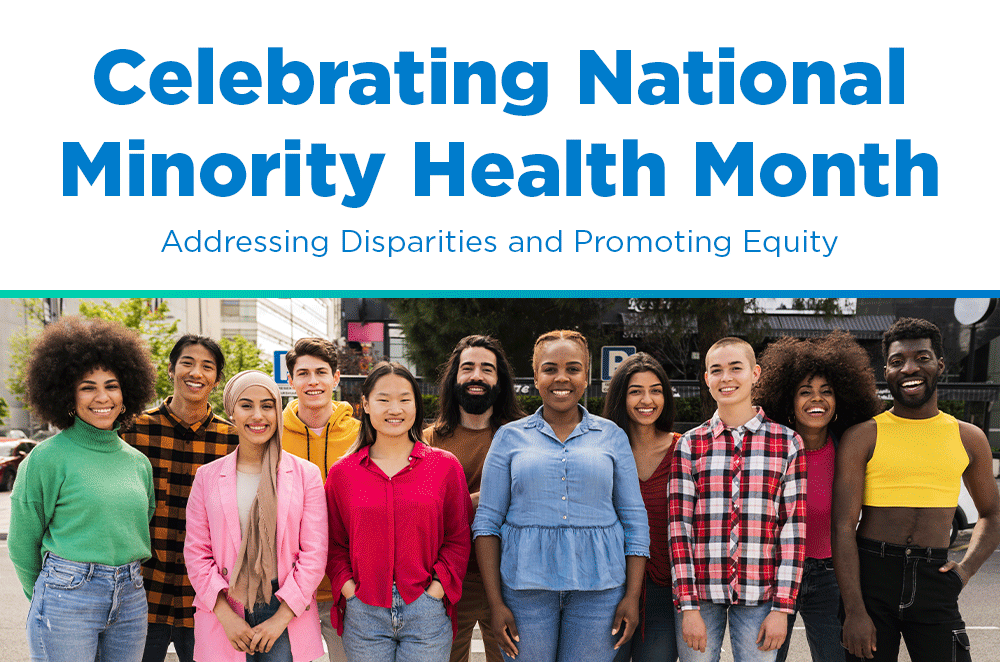April marks National Minority Health Month, a time dedicated to raising awareness about the health disparities faced by racial and ethnic minority communities in the United States. This observance serves as a reminder of the pressing need to address these inequalities and work towards achieving health equity for all.
Understanding Health Disparities
Health disparities refer to differences in health outcomes and healthcare access among various population groups. Unfortunately, racial and ethnic minorities in the U.S. experience disproportionate rates of chronic diseases, higher mortality rates, and lower life expectancies compared to their white counterparts.
According to the Centers for Disease Control and Prevention (CDC):
- African Americans are 1.5 times more likely to have diabetes compared to non-Hispanic whites.
- Hispanic adults are 50% more likely to die from diabetes compared to non-Hispanic whites.
- Native Americans and Alaska Natives have the highest rates of obesity among all racial and ethnic groups in the U.S.
- Asian Americans are at increased risk for certain types of cancer, such as liver and stomach cancer.
These statistics underscore the urgent need for targeted interventions and policies aimed at reducing health disparities and improving the overall well-being of minority communities.
Factors Contributing to Health Disparities
Several factors contribute to health disparities, including socioeconomic status, access to healthcare, discrimination, cultural factors, and environmental determinants. Limited access to quality healthcare services, language barriers, and systemic racism. Eliminating health disparities is not only a matter of social justice but also essential for public health and economic prosperity. When certain populations face barriers to accessing healthcare and experience poorer health outcomes, it affects the entire nation’s health and well-being. Reducing health disparities can lead to significant cost savings by preventing chronic diseases and reducing healthcare expenditures.
Steps Toward Health Equity
Improving Access to Healthcare
Ensuring that all individuals have access to affordable and culturally competent healthcare services is paramount. This includes expanding Medicaid coverage, increasing the number of healthcare facilities in underserved areas, and providing language interpretation services.
Promoting Health Education and Awareness
Educating communities about preventative measures, healthy lifestyle choices, and disease management is crucial for reducing the burden of chronic diseases. Targeted health education campaigns can help empower individuals to take control of their health.
Addressing Social Determinants of Health
Social and economic factors, such as poverty, housing instability, and food insecurity, significantly impact health outcomes. Addressing these underlying determinants requires a multifaceted approach, including affordable housing initiatives, job training programs, and access to nutritious food options.
Advocating for Policy Changes
Advocacy efforts aimed at eliminating discriminatory practices, expanding healthcare coverage, and promoting health equity policies are essential for creating lasting change. Policy interventions at the local, state, and federal levels can help address the root causes of health disparities and promote equity.
As we observe National Minority Health Month, it’s vital to reinforce our dedication to tackling health disparities and promoting equitable healthcare for everyone. Through collaborative efforts to break down obstacles, improve healthcare access, and tackle social determinants of health, we can pave the way for a future where every individual, regardless of race or ethnicity, has the chance to flourish and enjoy good health.
Resources:
https://www.cdc.gov/diabetes/library/features/hispanic-diabetes.html
https://www.cdc.gov/diabetes/pdfs/data/statistics/national-diabetes-statistics-report.pdf
Disclaimer:
The Comanche County Memorial Hospital website does not provide specific medical advice for individual cases. Comanche County Memorial Hospital does not endorse any services obtained through information provided on this site, articles on the site or any links on this site.
Use of the information obtained by the Comanche County Memorial Hospital website does not replace medical advice given by a qualified medical provider to meet the medical needs of our readers or others.
While content is frequently updated, medical information changes quickly. Information may be out of date, and/or contain inaccuracies or typographical errors. For questions or concerns, please contact us at contact@ccmhhealth.com.

